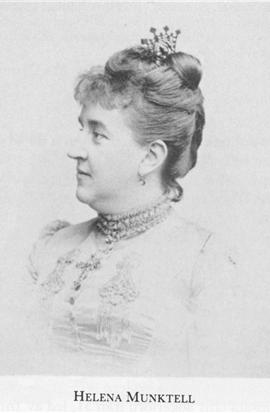Helena Munktell facts for kids
Helena Mathilda Munktell (born November 24, 1852 – died September 10, 1919) was a talented Swedish composer. A composer is someone who writes music. She created many different kinds of music, including pieces for orchestras, operas, and songs.
Contents
Her Early Life and Family
Helena Munktell was born in Grycksbo, Sweden. She was the youngest of nine children. Her father was Henrik Munktell. Her mother, Christina Augusta Eggertz, lived in Stockholm. After her father passed away, Helena and her family moved to Stockholm. Helena's sister, Emma Josepha Sparre, was a painter.
Her Music Education
Helena loved music from a young age. She studied music at the Stockholm Conservatory. There, she learned from important teachers like Ludwig Norman. She studied both piano and singing.
Later, Helena traveled to Vienna to continue her studies with Julius Epstein. She also went to Paris to learn more about composing. In Paris, her teachers included Benjamin Godard and Vincent d'Indy.
Her Career as a Composer
Helena Munktell's first public performance as a composer happened in Sweden in 1885. In the late 1890s, she began writing music for large orchestras. An orchestra is a big group of musicians playing many different instruments.
Helena became a member of the Royal Swedish Academy of Music in 1915. This was a great honor for a composer. In 1918, she helped start the Swedish Society of Composers. This group helps support composers in Sweden.
Later Life
Helena Munktell suffered from an eye disease later in her life. She passed away in Stockholm at the age of 67. She was buried in Norra begravningsplatsen in Solna, Sweden.
Helena's Musical Works
Helena Munktell wrote many different types of music. While she composed for orchestras, she especially loved writing vocal pieces, choral works, and operas. An opera is a play where the story is told mostly through singing.
Some of her well-known compositions include:
- Violin Sonata opus 21
- In Florence, an opera (1889)
- Bränningar (which means "Breaking Waves"), a symphonic poem from the early 1890s. A symphonic poem is a piece of orchestral music that tells a story or describes a scene.
- Suite for Large Orchestra (early 1890s)
- Valborgsmessoeld Poem Op.24 (1922)
- Suite dalécarlienne/Dalsuite (Dala Suite) Op.22
- Isjungfrun (Polar Queen), a ballad with words by her sister, Emma Josepha Sparre.
- May night Voices ("Hear how it calls us"), with words by Erik Axel Karlfeldt.
- Cantata for Women's Congress, 1897 ("Forward-walking")
Her music has been recorded and can be found on CDs. One example is Helena Munktell (1852-1919): Symphonic works, released in 2005.
See also
 In Spanish: Helena Munktell para niños
In Spanish: Helena Munktell para niños
 | William L. Dawson |
 | W. E. B. Du Bois |
 | Harry Belafonte |


